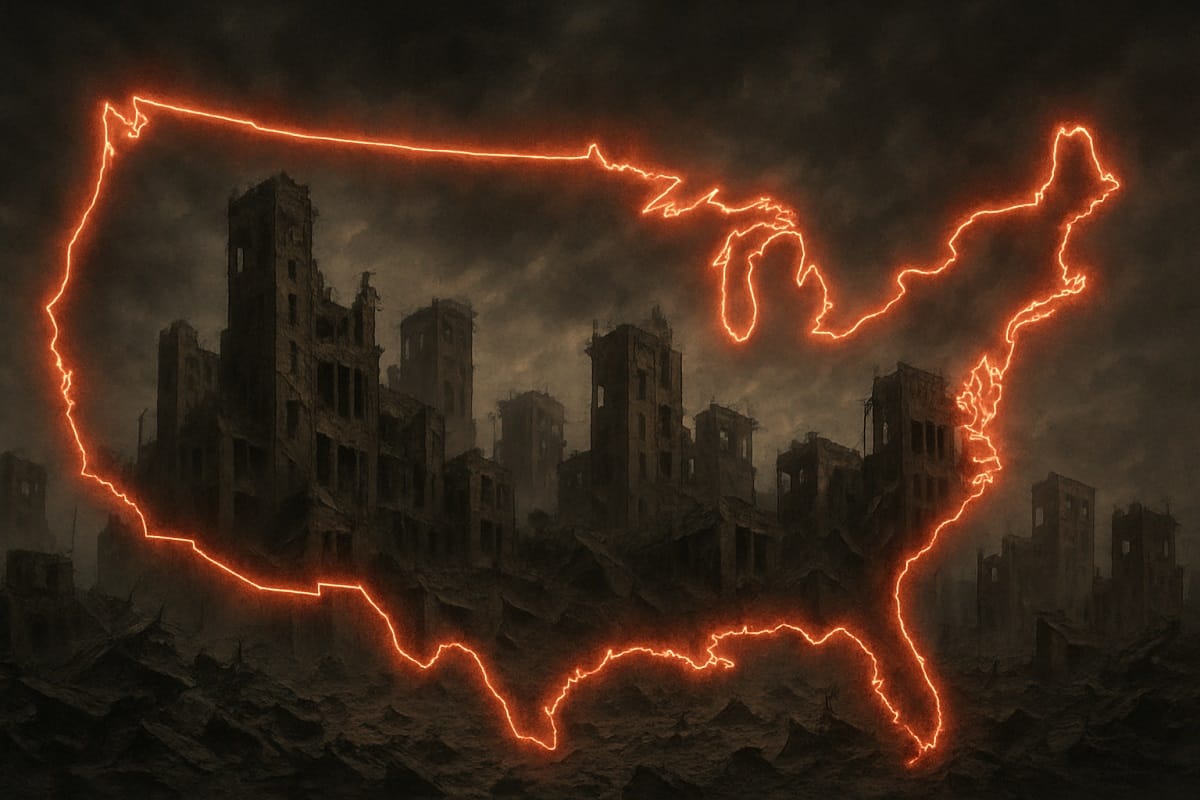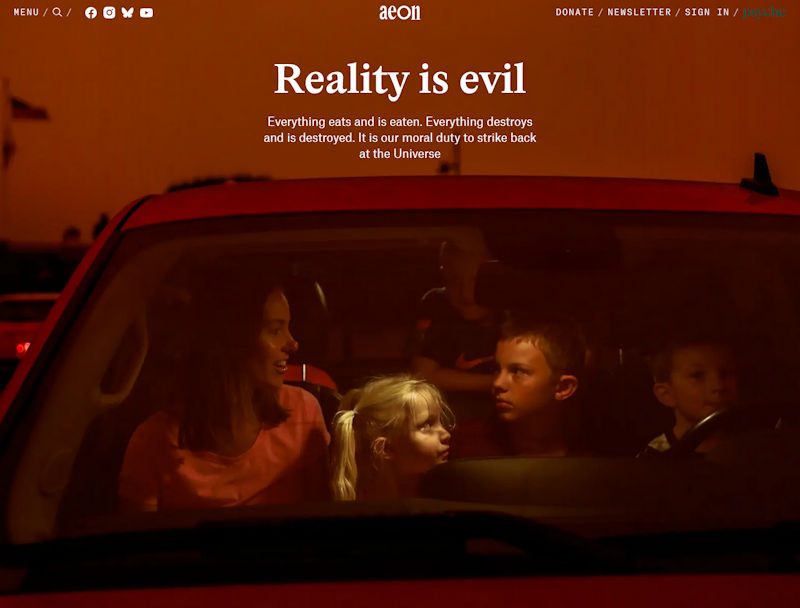Two thematic follow-ups to yesterday’s post.

OnlySky, Bruce Ledewitz, 20 Aug 2025: Can people thrive in a secular society?, subtitled “Are secular values the cause of our malaise?”
Yesterday’s post extended a theme on this blog concerning a range or divergence in human nature that I’ve previously characterized (following Lakoff) as conservative vs. progressive. Red vs. blue, tradition vs. change, and so on. Even, emotion vs. logic. That’s the simplex take. The complex take is every single person is a mix of various positions along multiple dimensions of human nature, and it requires such mixes and blends for optimal survival, given that circumstances change. Iron everyone down to a single traditional way of thinking, as the current administration and MAGA are trying to do, and society will suffer in the long run. Attacking diversity is self-defeating, if only because other societies that value diversity will then prevail.
Yet there are many who think traditional values are essential and secular values are actively harmful. This piece at OnlySky responds to a recent piece by David Brooks on that idea.
New York Times columnist David Brooks is once again attacking secular society, this time including not only secularism but individualism and self-expression, also. In the column, Brooks asks why more people in the world are hopeful, except citizens of Western democracies. His answer is that we are too secular, individualistic and self-expressive.
If certain surveys about the state of the economy, of health, are to be believed, why are American so unhappy? Well, the writer makes a point that certain *other* surveys indicate that relatively secular nations (like those in Scandinavia) are by their measures and happiest in the world. Anyway, if Books is right,
What should people do to change things? Brooks’ answer is simple—conservatives in America fare better because they do things that correlate with happiness: “get married, go to church, give to charity, feel patriotic, have more sex and feel life has meaning.”
But these, of course, are the priorities of basic human survival, and thus of base human nature (especially the church and patriotism parts). Which *also* entails hostility toward outsiders, and resistance to change. Which is how you get to MAGA. Is this what Brooks really wants?
Perhaps the priority is the “feeling that life has meaning.”
Some secular thinkers have responded to observers like Brooks by arguing that people make their own meaning. In other words, people decide what is meaningful for them.
But this is misleading. It is probably the case that a person must feel there is a point to human existence first, before embracing life and its many possibilities. Something about the human brain may just feel the need to be a part of something larger than one human life in order for a person to feel fulfilled.
Humanity’s religious traditions have historically supplied those larger narratives of the purpose of human life. The new secular contexts some countries are living today lack those explanations. Brooks’ argument raises the question whether such a narrative about human life is necessary to have a flourishing society. If Brooks is right, even to some extent, we secularists will have to decide how to respond.
Anyway, the smart ones figure out early that (as I said yesterday) the nationalistic and religious narratives exist precisely to bond the community and society together, all the better since they are not literally true. Are we to give up, for sake of Brooks’ “feeling that life has meaning,” acknowledging reality? That there is more to life than our one tribe? The article ends:
There are basically only two possibilities. One is to get used to the bad news. There is no general point to existence. We’re here and we might as well live as well as we can, but that is all you can say. This was the message of one of the original New Atheists—Philip Kitcher—in his [2007] book, Living With Darwin.
The other possibility is to decide that life has meaning even without a deity behind it. But that would require a spiritually revived secular movement. At the moment, a secular movement like that does not exist. And there is no sign that it will arrive any time soon.
(The article gets the date of the Kitcher book wrong; I looked it up.)
The essential problem is that the protocols of Brooks’ “meaningful” life break down when different societies are brought into competition, or when faced with complex problems. But I suspect Brooks is thinking only of America, and the MAGA-vision of a glorious, simpler past.
\\\
What would the solution be? What is the problem? Well here’s another piece that states the problem this way:
Aeon, Drew M Dalton, 22 Aug 2025: Reality is evil, subtitled “Everything eats and is eaten. Everything destroys and is destroyed. It is our moral duty to strike back at the Universe”
We might begin by considering what “evil” means, in the broadest possible sense. Notionally, any force against survival, from a person who would kill us, to the person who would abuse our child (because disturbing the natural development of a child might diminish their capacity to have children of their own). What is the basis for morality? Relying on a ‘god’ is circular, because ‘god’ is a creation of humans, reflecting the priorities of human nature; thus God has precisely the motivations for survival as base human nature — from having children to enjoying the smell of cooking meat. The basis for morality is whatever behavior optimizes for survival, given the circumstances, which change.
The physicists have pointed this out: there is no escaping the eventual death of the universe. Even if that’s billions of years in the future. That’s the sense that the writer means, I think, who begins:
Reality is not what you think it is. It is not the foundation of our joyful flourishing. It is not an eternally renewing resource, nor something that would, were it not for our excessive intervention and reckless consumption, continue to harmoniously expand into the future. The truth is that reality is not nearly so benevolent. Like everything else that exists – stars, microbes, oil, dolphins, shadows, dust and cities – we are nothing more than cups destined to shatter endlessly through time until there is nothing left to break. This, according to the conclusions of scientists over the past two centuries, is the quiet horror that structures existence itself.
We might think this realisation belongs to the past – a closed chapter of 19th-century science – but we are still living through the consequences of the thermodynamic revolution. Just as the full metaphysical implications of the Copernican revolution took centuries to unfold, we have yet to fully grasp the philosophical and existential consequences of entropic decay. We have yet to conceive of reality as it truly is. Instead, philosophers cling to an ancient idea of the Universe in which everything keeps growing and flourishing. According to this view, existence is good. Reality is good.
But what would our metaphysics and ethics look like if we learned that reality was against us?
The writer goes on to put the situation in terms of the laws of thermodynamics, which confound human fantasies about continued growth, even of a sustainable future. (Of course the timescales are wildly incompatible.)
Reality, as we now understand, does not tend towards existential flourishing and eternal becoming. Instead, systems collapse, things break down, and time tends irreversibly towards disorder and eventual annihilation. Rather than something to align with, the Universe appears to be fundamentally hostile to our wellbeing.
According to the laws of thermodynamics, all that exists does so solely to consume, destroy and extinguish, and in this way to accelerate the slide toward cosmic obliteration. For these reasons, the thermodynamic revolution in our understanding of the order and operation of reality is more than a scientific development. It is also more than a simple revision of our understanding of the flow of heat, and it does more than help us design more efficient engines. It ruptures our commonly held beliefs concerning the nature and value of existence, and it demands a new metaphysics, bold new ethical principles and alternative aesthetic models.
There’s always the danger, even among philosophers, of using words that imply some conscious intent. The universe isn’t consciously hostile; it just is. But the very structure of the universe has given rise to flows of energy that in some cases manifest themselves as beings, some of whom persist by developing and exhibiting behaviors that promote their survival. And some beings can endure for millions of years, even if the eventual death of the universe, over billions of years, is inevitable.
The writer goes on in detail about the laws of thermodynamics. Then find attempts to envision new visions of the cosmos, by Nietzsche, Stengers, Stiegler, and Mussett, inadequate.
We must start by admitting that the Universe is finite and will eventually end. Moreover, we must accept that the function of the Universe is to hasten this extinction. The laws of thermodynamics reveal, in other words, that what we might view as the generative power of the Universe is instead bringing about the annihilation of everything: the flourishing of life is always contributing to the eventual collapse of the cosmos.
And he invokes Sean Carroll and Nick Lane. And others. And ponders ethics.
What, then, are we to do? The only ‘ought’ we can tentatively derive from the vision of reality revealed by the thermodynamic revolution is this: it is our duty to strike back at the Universe. For it is precisely in the possibility of retaliating against the moral horror of existence that new ethical imperatives and aesthetic insights might be forged. Only by striving to break free from reality’s malign grip can we shape an ethics and aesthetics from the bleak metaphysics of entropic decay laid bare by contemporary science.
But the article ends there. As I’ve wondered before, where would this “ought” or “duty” come from? Simply from our will to survive?
Evening plans, so I need to wrap up this post for now. But I’ll follow up with further thoughts soon. There’s a piece or two missing.






